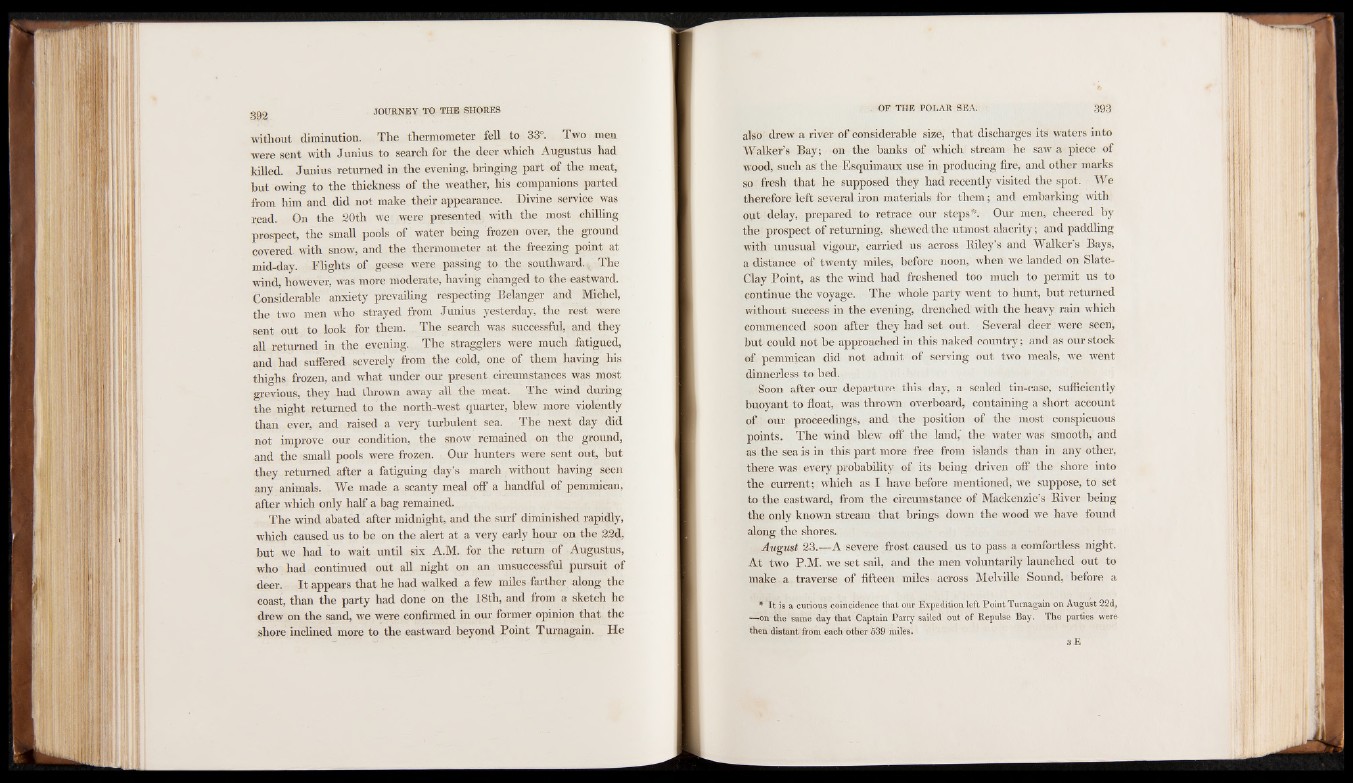
without diminution. The thermometer fell to 33°. Two men
were sent with Junius to search for the deer which Augustus had
killed. Junius returned in the evening, bringing part of the meat,
but owing to the thickness of the weather, his companions parted
from him and did not make their appearance. Divine service was
read. On the 20th we were presented with the most chilling
prospect, the small pools of water being frozen over, the ground
covered with snow, and the thermometer at the freezing point at
mid-day. Flights of geese were passing to the southward. 4 The
wind, however, was more moderate, having changed to the eastward.
Considerable anxiety prevailing respecting Belanger and Michel,
the two men who strayed from Junius yesterday, the rest were
sent out to look for them. The search was successful, and they
all returned in the evening. The stragglers were much fatigued,
and had suffered severely from the cold, one of them having his
thighs frozen, and what under our present circumstances was most
grevious, they had thrown away all the meat. The wind during
the night returned to the north-west quarter, blew more violently
than ever, and raised a very turbulent sea. The next day did
not improve our condition, the snow remained on the ground,
and the small pools were frozen. Our hunters were sent out, but
they returned after a fatiguing day’s march without having seen
any animals. We made a scanty meal off a handful of pemmican,
after which only half a bag remained.
The wind abated after midnight, and the surf diminished rapidly,
which caused us to be on the alert at a very early hour on the 22d,
but we had to wait until six A.M. for the return of Augustus,
who had continued out all night on an unsuccessful pursuit of
deer. It appears that he had walked a few miles farther along the
coast, than the party had done on the 18 th, and from a sketch he
drew on the sand, we were confirmed in our former opinion that the
shore inclined more to the eastward beyond Point Turnagain. He
also drew a river of considerable size, that discharges its waters into
Walker’s Bay; on the banks of which stream he saw a piece of
wood, such as the Esquimaux use in producing fire, and other marks
so fresh that he supposed they had recently visited the spot. We
therefore left several iron materials for them; and embarking with
out delay, prepared to retrace our steps*. Our men, cheered by
the prospect of returning, shewed the utmost alacrity; and paddling
with unusual vigour, carried us across Biley’s and Walker’s Bays,
a distance of twenty miles, before noon, when we landed on Slate-
Clay Point, as the wind had freshened too much to permit us to
continue the voyage. The whole party went to hunt, but returned
without success in the evening, drenched with the heavy rain which
commenced soon after they had set out. Several deer were seen,
but could not be approached in this naked country; and as our stock
of pemmican did not admit of serving out two meals, we went
dinnerless to bed.
Soon after our departure this day, a sealed tin-case, sufficiently
buoyant to float, was thrown overboard, containing a short account
of our proceedings, and the position of the most conspicuous
points. The wind blew off the land,' the water was smooth, and
as the sea is in this part more free from islands than in any other,
there was every probability of its being driven off the shore into
the current; which as I have before mentioned, we suppose, to set
to the eastward, from the circumstance of Mackenzie’s Kiver being
the only known stream that brings down the wood we have found
along the shores.
August 23.—A severe frost caused us to pass a comfortless night.
At two P.M. we set sail, and the men voluntarily launched out to
make a traverse of fifteen miles across Melville Sound, before a
* It is a curious coincidence that our Expedition left Point Turnagain on August 22d,
—on the same day that Captain Parry sailed out of Repulse Bay. The parties were-
then distant from each other 539 miles. 3E